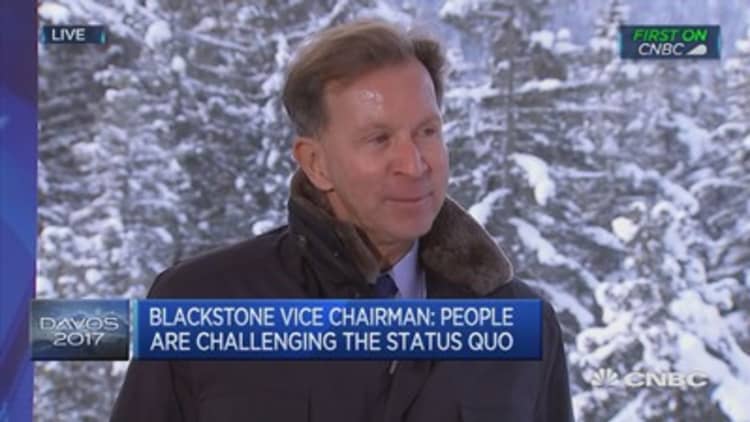
The majority of funds repatriated by U.S. companies will likely be spent on shareholders rather than investment in capital and people, Blackstone Vice Chairman John Studzinski told CNBC at the World Economic Forum in Davos on Tuesday.
"I would guess that two-thirds of the cash will go back to share buybacks and extraordinary dividends — so I think one of the things that's disconnected right now is this notion that all the money's going to go back to building plants and creating jobs," the senior managing director at the world's largest alternative investment firm said.
"Some of it will go to R&D because it has to, but I think a large portion of it, if I were to line up 20 CEOs, … the majority of them will say more than 40-60 percent of the cash will be used for share buybacks which will continue to support the stock market and to enhance share prices even further," he added.
Speaking to the exuberant reaction of the stock market since the U.S. elections in November, Studzinski noted high levels of excitement over the prospect of a stimulus from monetary, fiscal and structural actions.
He described these three factors as having been catalyzed by the impending advent of President-elect Donald Trump, with investors now looking forward to reaping the benefits of the emergence of new businesses, lower tax rates and further economic stimulus.
Turning to the U.K., shortly ahead of the much-awaited speech by Prime Minister Theresa May, Studzinski sounded a note of confidence that the country's leader knew what she was doing with regards to the Brexit process.
"Theresa May is a very thoughtful, structured, disciplined leader. The press is trying to create this image that she is approaching Brexit like she doesn't know how to negotiate," he contended.
Studzinski told CNBC that he expects May's first priority will be to understand the type of trade agreement that it will be possible for her government and that of the U.S. to forge within the coming months.
"The press has to separate her mindset and her team's mindset in terms of what they want to accomplish from actually how they implement it — I think they're muddling that. I think she probably has a very clear view of what she wants to accomplish. But as you and I both know, you can't negotiate a serious agreement in public," he concluded.






